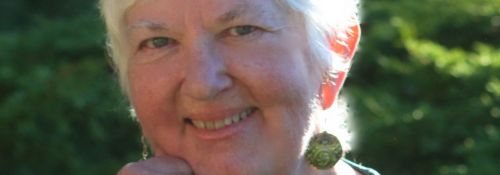
Cynthia Trenshaw: Serving in the Margins of Society
By Emma Vinton
“For 20 years, my workplaces have been one city’s infamous slums and another city’s hospital corridors and emergency room cubicles.”
This is the prologue of Cynthia Thomas Trenshaw’s book, Meeting in the Margins: An Invitation to Encounter Society’s Invisible People. Published last October, the book tells a series of stories of Trenshaw’s work serving the sick, suffering, impaired, and homeless. She does not use the term “the poor;” rather, she says, she works with “the marginalized.”
Trenshaw studied at Hillsdale College from 1960 to 1961. She married Joe Trenshaw, ’63, the summer after her freshman year. The couple initially moved away because they could not afford Hillsdale, but soon returned because they missed the community. Trenshaw says that, through odd jobs and frugality, Joe was able to finish his bachelor’s degree.
Not until nearly 30 years later —just before turning 50—did Cynthia gain her own bachelor’s degree at Aquinas College in Grand Rapids, Michigan. She then earned a master’s degree at the Jesuit School of Theology at Berkeley. At this time, Trenshaw says, her work in the margins of society began.
She worked as a hospital chaplain during her undergraduate years in Grand Rapids, where she spent time with people of all ages, from young boys in a mental hospital to patients in a 200-bed nursing home. “I found that I loved working with people who were dying, and who were in crisis in the emergency room,” Trenshaw recalls. “All of those people are marginalized because our culture does not want to see them.”
When in California, Trenshaw became involved in offering massage therapy to those living on the streets of San Francisco. “That’s where the marginalized people took over my life,” she said.
Trenshaw says that, in order to tell the stories of the marginalized, she had to put herself in the story, which she was reluctant to do. When she finally gave in to the voice of the book and let the story emerge organically, she was able to write and publish it in two years.
One part of her book—titled “Gloria”— describes Trenshaw’s encounter with a woman on the streets of San Francisco. Trenshaw vividly describes the woman, the foot massage that she provided, and the reciprocality of the experience. Her book is filled with similar stories and vignettes, and what she learned from more than 20 years of working in the margins.
“I receive as much if not more than the people that I was with,” Trenshaw said. “I learned simply to go and be present to others, and not to think that I can or should change anything.”
Trenshaw currently resides in “gray and rainy Whidbey Island” Washington, as she describes her home, and she works as guardian ad litem for three counties in the state.
She hopes that her book will be read by human services students, church groups, and discussion groups that want a challenging read. Trenshaw says that, like writing the book, her work offered similar challenges. “It takes humility to be with people who are exactly like me but in different circumstances,” she said.
Through her experiences, Trenshaw wants others to learn to see “the invisible people of the margins. The first thing is to have the courage to notice,” she says. “If everyone were willing to see the marginalized, there wouldn’t be margins. Once we take the risk to see, to stand and be with as a peer, as the same human stuff, we can hear their story. Hear your story.”
Printed in the Spring 2016 Alumni Magazine